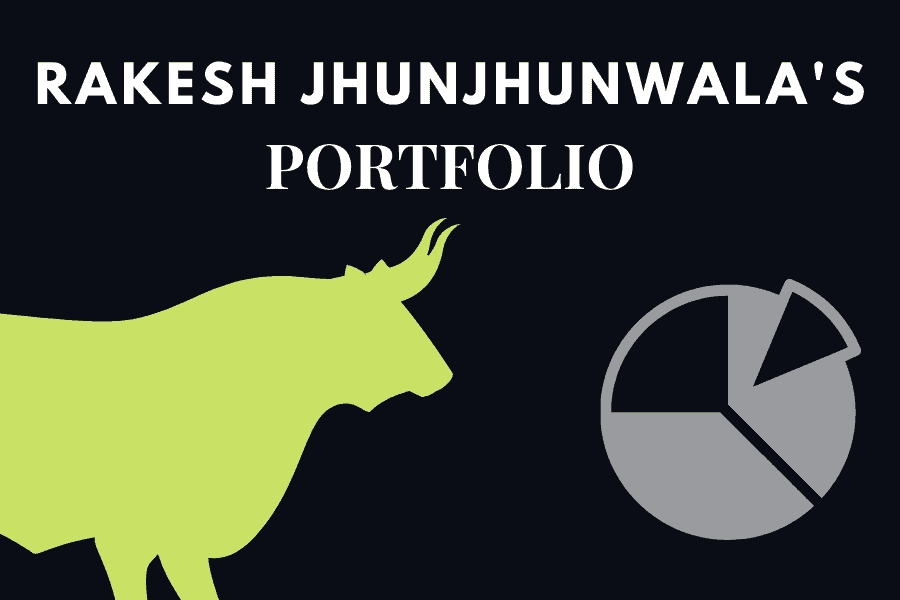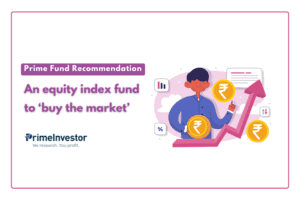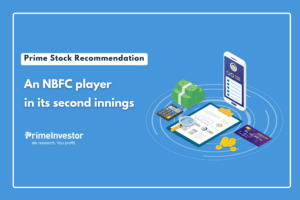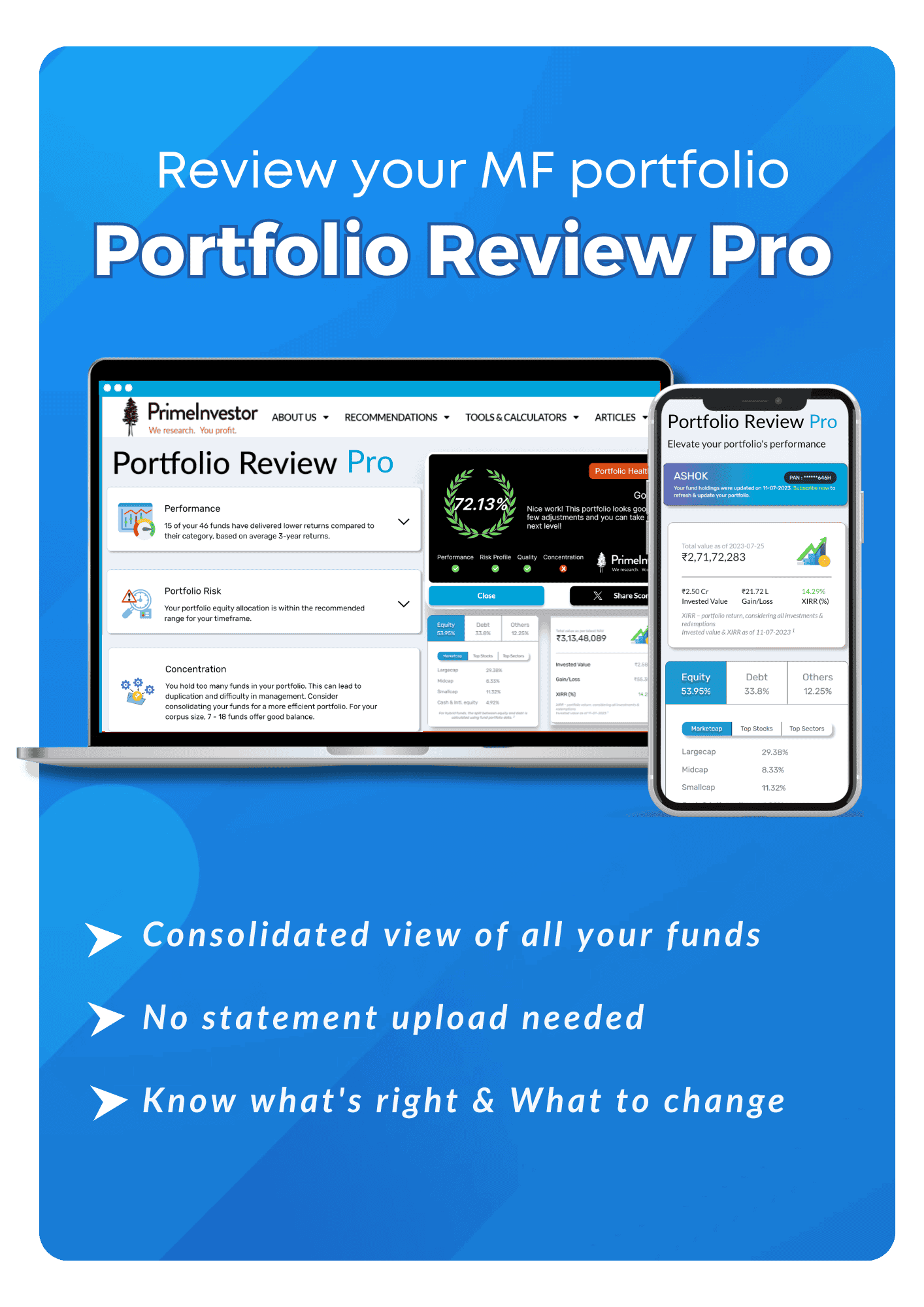Rakesh Jhunjhunwala, fondly known as the Big Bull has become a name synonymous with the term multibaggers! By far, Rakesh Jhunjhunwala is the most successful investor in India with a portfolio worth nearly $4.5 billion (listed + unlisted equities). It is up by a whooping 32% in the last 6 months.
You can easily access the constituents of Rakesh Jhunjhunwala Portfolio since companies need to disclose large shareholders each quarter. Rakesh Jhunjhunwala portfolio (listed) is easily accessible, since companies need to disclose large shareholders each quarter. But it is not that easy to build your investments based on it. The reasons why it is hard to replicate the portfolio and its success are many.

But a few among those reasons include – the proportion he holds in each stock, his exposure to private, unlisted companies and the way he may have averaged his portfolio. Beyond all, it is not easy to mimic his conviction!
But don’t read me wrong here. I am not averse to copying as long as you know whether it fits your requirement. Well-known fund manager and author of Dhandho Investor, Monish Pabrai, once said; “I’m a shameless copycat”. Monish Pabrai was known to follow Warren Buffett and clone his investments.
So, even if you may not be able to emulate Rakesh Jhunjhunwala’s success with stock investing, you can get some insights by studying his portfolio. Let’s try to look at what insights they offer now, the sectors he is betting on and how to benefit from them.
Let’s first start with his list of holdings to discuss more.
Rakesh Jhunjhunwala’s portfolio at the end of 30th June 2021
What the Rakesh Jhunjhunwala portfolio tells you
An individual’s stock portfolio can reflect many things about an investor. Here are three key things one can read:
- Bias
- Character
- Courage & conviction
When it comes to the Rakesh Jhunjhunwala portfolio, it is hard to point out any particular ‘bias’ he may have. But we can observe two things: one his focus on the big picture and equally so, his unrelenting focus on valuation. Rakesh Jhunjhunwala added stocks from undervalued segments with focus on the big picture in the last 1 year. These included stocks of traditional banks, metals and pharma, before their rally began.
But at the same time, some of his top stocks such as Titan are expensive today. While he has held them for a long time, understanding the need for a ‘quality basket’, he did not add these stocks in recent times, knowing that they are expensive.
On portfolio “character”, the portfolio is concentrated and reflects a few big bets and then a tail of smaller bets. His single largest holding is 37% of the portfolio while his next 10 holdings form 44% of his portfolio. Do remember that this proportion has grown to 37% over time and not built with such concentration. Interestingly, Warren Buffet’s Berkshire Hathaway holds 41% of its portfolio in Apple stock and a few other large corporations make up for another 40%.
Rakesh Jhunjhunwala has also made few large investments outside the listed space (Star Health and Zydus Animal Health). Rakesh Jhunjhunwala also believes strongly in quality management of the companies he has invested in and does not hesitate to quiz the management in public investor forums.
When it comes to “courage & conviction”, the big bull is right on top. As Warren Buffet famously said, “The most important quality for an investor is temperament, not intellect”. Be it with his Rs. 1,000 crore plus bet on Tata Motors post COVID-19 when it was in bad shape or going upbeat on troubled PSU banks and metal stocks, Rakesh Jhunjhunwala’s portfolio showcases his “courage & conviction”.
His foray into low-cost airline business now further vindicates this.
Despite headwinds for his top holdings like CRISIL and Lupin for a few years now, he held onto them and even increased his stake. He has a record of holding some of his stocks for a long time despite poor performance track-record, be it NCC in infrastructure or Karur Vysya in banks or Geojit in stock broking or Agrotech Foods in consumer. In NCC, he holds the second largest stake after its promoters.
Takeaway: It is not easy to buy and hold stocks in the face of underperformance/ adversities. It needs courage and conviction. It is not easy to pick stocks when the sentiments around them are negative. It needs a vision of the future rather than just fear of the past. If you wish for multibaggers, you need this same courage to enter early stage businesses and the conviction to hold and finally, the ability to take failures.
What is Rakesh Jhunjhunwala betting on now?
Digging deeper into stocks added over the past year in the Rakesh Jhunjhunwala portfolio, you will find that he is upbeat on automobile stocks, a few financial stocks, metal stocks, a large hotel stock and few beaten down infrastructure stocks. And of course, pharma remains one of his favorites. These are representative of the larger themes he has been vocal about in the recent past. He has been extremely bullish on the Indian stock market. Here are some of the extracts from his recent talks and our understanding of it.
- Corporate profits will grow to 5% of GDP
This statement has to be seen in sync with his own bets in the steel, PSU bank and other cyclicals spaces. For example, profits of companies like Tata Steel, JSW Steel and SBI have seen a massive revival compared with previous fiscal. Top steel companies and large PSU banks could together add 1% to corporate profits all by themselves if the segments see a revival.
The Production Linked Incentive (PLI) schemes worth 2.4 lakh crores that Govt has recently announced for various manufacturing sectors to promote domestic manufacturing could add another 0.25%, assuming a return on investment (RoI) of 20%. And there could be profit recovery coming from other cyclicals as well. The corporate profits to GDP ratio fell from 5.5% of GDP in FY08 to less than 2% by FY20
- Cycle is turning in favor of traditional banks including old private sector and PSU banks (which he referred to as inefficient banks)
If there is a sustainable economic recovery going ahead, this could be the outcome. Because credit growth, that has been falling in last decade, has hit decade low post COVID. It has fallen from a high of 18% at the beginning of this decade to almost 5% at the end. Economic growth is the strongest tailwind for traditional banks which carry the advantage of a robust deposit base that provide them with a source of low-cost funds. Credit demand will bring back growth in lending cycle, followed by a profit cycle, decline in bad loans and better overall performance
- Upbeat on metal stocks due to cheap valuations
This theme has started playing out well. While the first trigger came in the form of price recovery post global stimulus, an additional trigger came when China withdrew export incentives for the sector. Meanwhile, the top metal companies are also much bigger in their production capacities than in the previous cycle. To put valuations in perspective, the average market cap of some of these companies in the last 10 years was less than their FY21 EBIDTA. Q4FY21 numbers Or Q1FY22 numbers could serve as a guide on their valuations based on current metal prices.
- Bright prospects for pharma sector
This is one sector that has featured in the Rakesh Jhunjhunwala portfolio for a long time and one he is quite upbeat on. The confidence is buttressed by the capabilities of companies on one side and emerging demand scenario in domestic and global markets on the other side. India is already a major player in generic drugs catering to 40% of US demand and 25% of UK demand. While the back-end (comprising the manufacture of raw materials or Active Pharmaceutical Ingredients - API) is not much integrated, it is happening at a good pace in specialty and complex APIs.
- Reforms in the recent past to aid long term growth
Rakesh Juhunjhunwala has been a reforms enthusiast and has particularly emphasized on reforms like Goods and Service Tax (GST), Insolvency & Bankruptcy code (IBC), Real Estate Regulatory Authority (RERA) to bring in best practices in the industry and digitization initiatives. IBC has aided huge recovery from metal sector and paved the way for strong consolidation. Like-wise consolidation has also happened in sectors like real estate.
If we look at the stocks that Rakesh Jhunjhunwala bought in the last one year, you will see that he shopped for beaten down stocks in auto, financials, metals, and infrastructure. His shopping list throws names like Tata Motors, SAIL, and Tata Communications as new additions while he increased stake in Indian Hotels and Edelweiss. You can also find beaten down names like Indiabulls Housing, Va-Tech Wabag and Wockhardt making way into the Rakesh Jhunjhunwala portfolio.
Takeaway: Rakesh Jhunjhunwala has been very vocal about his bets and has provided insights on why he is bullish on certain segments. But that does not absolve you from digging deeper, understanding the businesses and valuations before you take a call. You will do better by using those insights to create a portfolio based on your own conviction. If it were that easy to make money on borrowed conviction, we would all be rich!
Don’t follow blindly
Rakesh Jhunjhunwala is known for his twin capabilities of trading and investing. Sometimes, stocks that appear as part of his shareholding in a quarter’s shareholding pattern disclosure could be just his short-term trading position.
In the last 1 year, he has bought highly volatile stocks like Indiabulls Housing, Tata Motors and Wockhardt. At one point, he jumped into DHFL when it collapsed. Shareholding for March 2019 showed that he held 1 crore shares or 3% stake of this stock but exited it within a quarter. He entered Va-Tech Wabag, a beaten down infrastructure stock with cash flow issues, at Rs.160 last year through preferential allotment.
Sometimes investors of his stature could get opportunities to buy into beaten down stocks as a strategic investor at attractive prices. But, these kinds of stocks may not be what a retail investor can handle. For one, you may not be able to handle the volatility and pain of a loss. Two, it is not easy to time the entry and exit.
The tail-end of the portfolio offers instances of mistakes Rakesh Jhunjhunwala may have made. But, whatever right things he did had a bigger impact on his wealth and were able to compensate for stock picks that failed. As George Soros, one of the greatest money managers, said; “It’s not whether you are right or wrong that is important, but how much you make when you are right and how much you lose when you are wrong”
Takeway: There could well be several investors who burnt their fingers chasing his every investment in the Rakesh Jhunjhunwala portfolio, in the fond belief that every investment he made would turn out to be a multibagger. Therefore, it’s important not be swept up by market beliefs, or have blind faith in an investor’s stock picks no matter how large or how successful. It’s important to know that there will be mistakes made, even by investing legends such as Rakesh Jhunjhunwala. The lesson to learn from him is how to keep the impact of such missteps low and get strong returns in top bets.
More stakes in the unlisted space
Of late, the Big Bull has been making significant investments in the private market space. He, along with his wife, holds 18% of Star Health, acquired in 2019. This company has filed its DRHP for an IPO. Sources state that the insurer is eyeing an IPO valuation of $3 billion - in which case Rakesh Jhunjhunwala’s holdings will be valued at $550 million or Rs. 3,950 crore, next only to his Titan holdings in terms of value.
But these are bull market predictions and are best taken with truckloads of salt at this point! He has also teamed up with PE giant, Multiples, to buy out the animal health division of Cadila Healthcare for around Rs.3,000 crore. And most recent is his new low-cost airline venture where he will hold 40% stake, beginning with a modest capital base. The Big Bull has been seen cutting down on his holdings in Titan, maybe to fund a few of these deals.
Takeaway: You are unlikely to be able to take such bets, at this scale. But the learning is to discover lesser known businesses at an early stage and have the conviction (and deep pockets) to stick to them.







